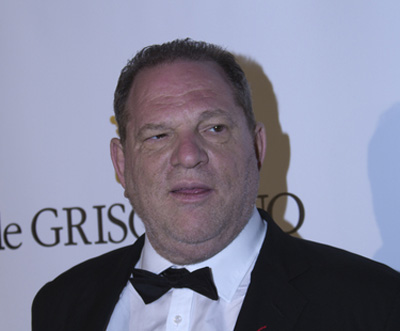Judge rejects Harvey Weinstein's dinner-and a-movie hypothetical, allows civil sex-trafficking suit

Harvey Weinstein/Dennis Makarenko (Shutterstock.com).
A federal judge in Manhattan has refused to dismiss a lawsuit filed by a British actress who sued producer Harvey Weinstein for an alleged violation of the federal sex-trafficking law.
U.S. District Judge Robert Sweet allowed the suit by Kadian Noble in an opinion released Tuesday, report the Wall Street Journal, the New York Times and the New York Law Journal.
Sweet rejected a contention by Weinstein’s lawyers that authorizing the suit could lead to all manner of civil claims by those in sexual relationships with powerful people.
The Journal calls the lawsuit “an unorthodox use of a federal sex-trafficking statute.” The law in force at the time of the alleged assault barred the use of force, threats, fraud or coercion to recruit or entice a person to engage in a commercial sex act. It also authorized a private right of action for damages against violators.
Noble had alleged that Weinstein invited her to his hotel room during the Cannes Film Festival in May 2014 to view her film reel. She had submitted the reel after previously meeting Weinstein and one of his assistants.
In the hotel room, Noble claims Weinstein put her on the phone with a producer who said they would work with Noble if she was “a good girl” and did whatever Weinstein wanted.
Noble claimed Weinstein groped her, pulled her into the bathroom, and controlled her with his hand as he masturbated in front of her, promising that everything would be taken care of if she relaxed. On her way out of the hotel room, Weinstein told Noble “his people” would be in touch with her, Noble alleged. No film role ever materialized.
Noble claimed Weinstein violated the law by using fraud—the false promise of a movie role—and physical force to get her to engage in a commercial sex act.
Weinstein contended that application of the law to the alleged situation would unfairly expand the sex trafficking statute to cover all sexual activity when one person has a position of power or influence. He also contended that there was no commercial sex act because nothing of value was exchanged.
Weinstein’s lawyers had written: “Query whether an individual who treats a person to a free dinner and a movie, promises future outings and/or gifts, and then attempts or engages in what he or she construes as consensual sexual activity, could be prosecuted” under the sex-trafficking law.
Sweet dismissed Weinstein’s brother, Robert, as a defendant in the suit, but allowed the suit against Harvey Weinstein to proceed.
Noble’s suit adequately alleged that Weinstein’s actions constituted an enticement through fraudulent means, as well as through physical force, Sweet said. And the expectation of a movie role constituted something of value, satisfying the definition of a commercial sex act, the judge said.
Sweet rejected Weinstein’s dinner-and-a-movie hypothetical. “Notably absent from this hypothetical,” Sweet said, “are the necessary elements of force, fraud and commerce, all of which have been established here.”
Weinstein’s lawyer, Phyllis Kupferstein, said the decision would be appealed. “We believe these claims are not legally or factually supported, and ultimately will not be sustained,” Kupferstein said in a statement published in the articles.
Weinstein is also facing criminal charges for the alleged sexual assault of three women. He has denied any nonconsensual sex.



